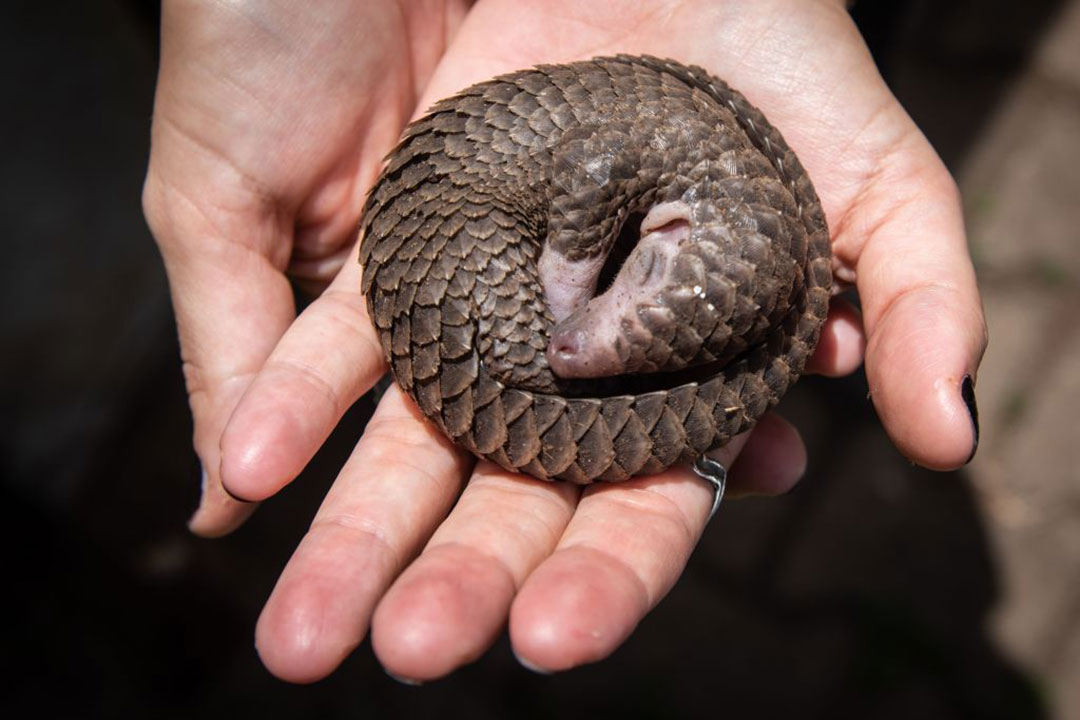Forensic Science Helps Point Finger at Pangolin Poachers
ADF STAFF
In April 2019, officials in Singapore intercepted nearly 13 metric tons of pangolin scales. They were hidden in dozens of identical sacks.
It was the largest case of pangolin-related smuggling in a year in which customs authorities discovered nearly 70 metric tons of scales moving secretly between Africa and Asia, largely to support the market for traditional Chinese medicine (TCM).
Putting a stop to the trade in pangolin parts means determining where they came from and who might be responsible for poaching them.
Until recently, those details were hard to pin down.
Increasingly, researchers and wildlife advocates are turning to forensic science to pinpoint the origin of pangolin parts and catch the people smuggling them. In many cases, they’re using techniques developed to catch ivory poachers.
In the forests of Gabon’s Lopé-Okanda Wildlife Preserve, a team of experts recently captured an elusive giant pangolin nicknamed Ghost. They collected fluid, tissue and scale samples from the animal.
By analyzing the scales, researchers can determine the precise chemical composition of the pangolin’s native environment, a process known as isotopic fingerprinting. In doing so, Gabonese researchers are breaking new ground in fighting wildlife trafficking.
“We are basically fighting on our own at the moment. And we still haven’t been able to win this war,” Lee White, Gabon’s minister for forests, oceans, environment and climate, told The Guardian.
The United Nations’ 2020 “World Wildlife Crime Report” documents that seizures of illegally trafficked pangolins skyrocketed from less than 5,000 in 2007 to nearly 142,000 in 2018, the most recent year for which numbers are available. Between 2014 and 2018, customs agents uncovered the equivalent of 370,000 trafficked pangolins globally.
Nigeria, Cameroon and the Democratic Republic of the Congo have become major sources of pangolin parts for the TCM trade. In about 25% of cases, pangolin scales travel side by side with poached elephant ivory, a key indicator that criminal gangs are behind the trafficking, said Sam Wasser, director of the Center for Conservation Biology at the University of Washington.
That’s why forensic science can be such an important tool, he said.
When customs agents discover a trove of jumbled scales as they did in Singapore, genetic testing — digging into the scales’ DNA — can reveal which of the eight subspecies produced them, narrowing down whether the scales came from Africa or Asia.
Researchers in the United Kingdom recently learned they could lift actual fingerprints from pangolin scales using gelatin lifters, small sheets with adhesive on one side commonly used by crime-scene investigators. Unlike genetic or isotopic testing, the gelatin lifters are easy to use in the field.
“To our knowledge, no one is using the gel [lifters] to look at wildlife crime,” Christian Plowman, a former detective with the U.K.’s New Scotland Yard and the law enforcement advisor for the Zoological Society of London, told National Geographic. “This is the first time evidential level fingermarks have been obtained from pangolin scales.”
Although DNA testing narrows down species and gelatin lifters collect human evidence, isotopic fingerprinting relies on the fact that hair, scales and other body parts made of keratin record the chemical makeup of things such as the animal’s diet and environment. By examining quantities of oxygen, hydrogen and other elements, researchers can narrow the geographic source of pangolin scales.
In the endless game of cat and mouse, law enforcement shuts off smuggling routes and contraband sources, and poachers open new ones. Organized crime syndicates are hiring specialists outfitted to work in remote areas far from law enforcement, according to Katherine Abernathy, an ecologist at the University of Stirling in Scotland and team leader at the university’s African Forest Ecology Group.
As the home of three of Africa’s four pangolin species, Gabon is ripe for syndicates to exploit, Abernathy says in her study.
“We recommend adjusting conservation policies and actions to impede further development of illegal trade within and from Gabon,” she wrote in a 2018 study published in the African Journal of Ecology.
Aurelie Flore Koumba Pambo, chief scientist at Gabon’s National Agency for National Parks, told Bloomberg Environment the illegal wildlife trade goes beyond harming nations’ natural heritage.
“It also undermines good governance and reduces revenue from sustainable economic utilization of wildlife-based tourism,” she said.


Comments are closed.